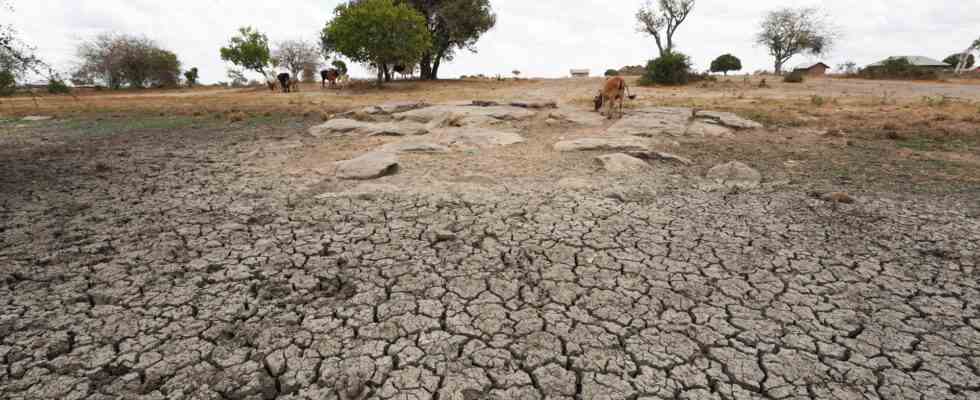Status: 11/08/2022 2:13 p.m
An expert report published for COP27 estimates the annual cost of fighting the climate crisis in emerging and developing countries at 2.4 trillion euros. The industrialized countries should bear a large part.
The developing and emerging countries of the so-called Global South will need a sum of around 2.4 trillion euros per year until 2030 to combat the effects of climate change and to implement the transition to a more sustainable and climate-friendly economy. This is the conclusion of a report by economists and environmental experts published as part of the current COP27 world climate conference.
The analysis was jointly commissioned by Egypt, the current host country of COP27, and the UK, which hosted last year’s UN climate conference.
Discussion about more climate aid at UN conference in Egypt
Daniel Hechler, ARD Cairo, daily news at 2:00 p.m., November 8th, 2022
“Crucial Decade”
In the report, the authors call for a “comprehensive and rapid investment boost” in order to promote “strong and sustainable development” in the countries concerned. These investments could fuel the growth and transition of “key systems” such as energy or transport, water use and agriculture. In their analysis, the experts spoke of a “decisive decade” in order to prevent “immense and irreversible damage from climate change and biodiversity loss”.
Almost 50 experts have participated in that Finance for Climate Action report contributed. It was chaired by Vera Songwe, economist and Executive Secretary of the UN Economic Commission for Africa, and British economist Nicholas Stern. Stern is Chair of the Grantham Research Institute, which studies climate change and the environment. Amar Bhattacharya of the US think tank Brookings headed the group of experts as executive secretary.
The report covers emerging and developing countries with the exception of China. The Chinese economy is the second largest in the world and advanced in many ways.
Investments in energy, agriculture and against climate damage
According to the expert group, the annual sum of 2.4 trillion euros should be raised for three key points: on the one hand for the switch to affordable, clean energy, on the other hand for dealing with climate damage caused by extreme weather phenomena such as droughts or floods. The developing countries are much more susceptible to this than the industrialized countries. And thirdly, for the development of sustainable agriculture.
Industrialized countries are to raise one trillion
According to the analysis, around one trillion euros should be raised each year by the industrialized countries as well as by foreign investors and multilateral development banks. Investments in emerging and developing countries, with the exception of China, currently amount to around 500 billion dollars.
“Rich countries should recognize that it is in their own fundamental interest to invest in climate action in emerging and developing countries,” said British economist Stern. In addition, given the effects of the high current and previous greenhouse gas emissions of these countries, it is “also a question of justice”.
The remaining sum of around 1.4 trillion dollars must therefore be made available by private or public investors within the developing and emerging countries.
Billions in aid agreed for South Africa
Such a step for greater financial support for the Global South was already agreed at COP27: Germany and other industrialized countries have pledged billions in aid for South Africa so that the country can turn its back on coal.
The aid of 8.5 billion dollars (almost 8.5 billion euros) planned by Germany, Great Britain, France, the European Union and the USA is to be used, among other things, for the decommissioning of coal-fired power plants and the promotion of renewable energies, it said in a statement released in Sharm el-Sheikh.
Germany pledges more than one billion euros
The industrialized countries approved the South African plan to move away from coal. The support program will help “clean energy thrive in South Africa’s economy,” US President Joe Biden was quoted as saying in the statement.
According to the Federal Development Ministry in Berlin, Germany has already provided 700 million euros for South Africa’s exit from climate-damaging coal and has pledged a further 320 million euros in recently concluded negotiations.
According to the information, Germany and South Africa are cooperating, among other things, in the construction of solar and wind power plants and in lines for the transmission of green electricity. These investments should create new jobs, especially in the coal regions. Germany also supports programs for the retraining of former coal workers and for training in the professions urgently needed in the energy transition.
Partnership launched in Glasgow
South Africa – the largest economy on the African continent – has been dependent on coal for 80 percent of its electricity generation. Developed countries’ partnership with South Africa on moving away from coal is one of the collaborations known as the Just Energy Transition Partnership, or JETP for short.
The JETP was launched last year at the UN climate conference in Glasgow to enable a faster and socially just transition of developing and emerging countries to a climate-friendly economy.
Federal government wants to give six billion euros to developing countries in the fight against the climate crisis
Jan Zimmermann, ARD Berlin, November 7, 2022 1:29 p.m

